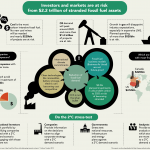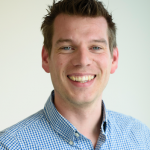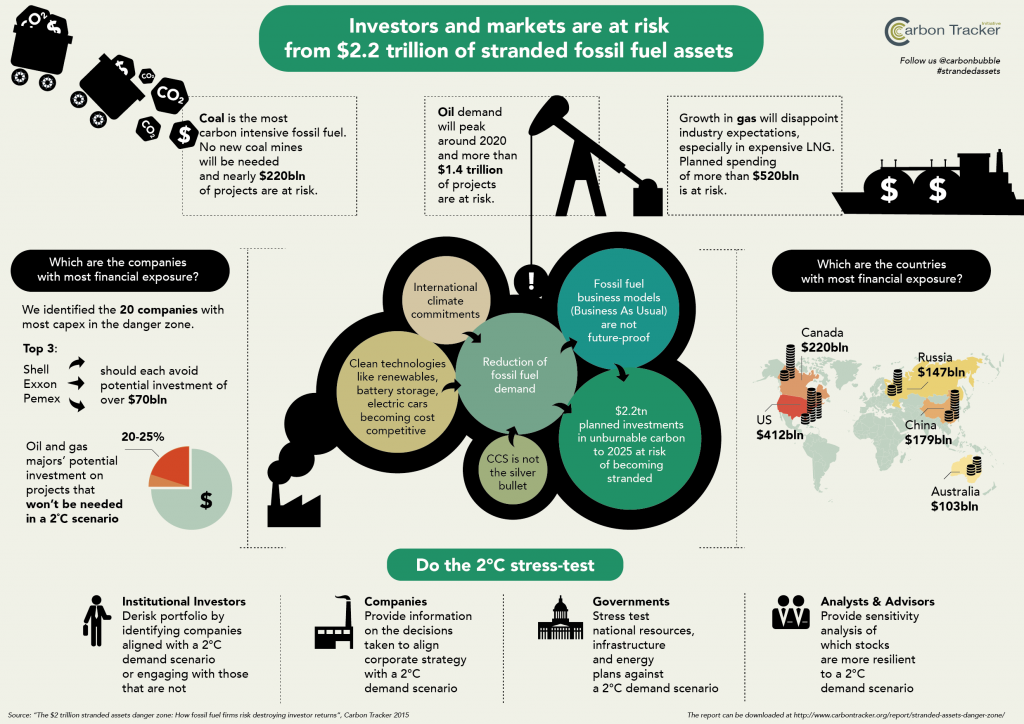
Update 29 November: Please find the slides of the conference here.
[divider scroll_text=”SCROLL_TEXT”]
Climate change has enormous economic, social and financial implications for economies around the world. The famous 2006 Stern Report urges us to take action, and claims that postponing action will only cost us more in the end. However, one of the risks that results from the energy transition is the unanticipated and accelerated devaluation of existing assets, also known as ‘Stranded Assets’.
Our economy is very dependent on fossil resources and carbon-intensive assets today. At the same time evidence is suggesting that our carbon economy is very vulnerable. Talks about carbon risks have moved from NGO discussion papers to serious consideration of large companies across the globe. So far, divesting from carbon assets has come from political or ethical grounds. However, recent alarming reports by the Carbon Tracker Initiative, the DNB and others indicate that there is a financial reason too: investments in carbon assets have become risky.
The bi-annual YES-DC conference aims to give a broader perspective on the energy transition and its impact on the economy. Several experts (listed below) will share their views on the future of the carbon economy. We are looking forward to an interactive afternoon, that will give you insights into this complex topic.
[message_box title=”Conference details” color=”white”]
Date: November 5th, 2016
Time: 13:00 (walk-in) 13:30(start)
Location: Academiegebouw, Domplein 29, 3512 JE Utrecht
[/message_box]
[message_box title=”Agenda” color=”white”]
13:30-13:45 : Introduction by YES-DC
13:45-17:00 : Presentations and interactive sessions
17:00-18:00 : Drinks
More detailed information about the programme will soon be available
[/message_box]
Chairman of the day
[message_box title=”Rick Bosman, Researcher, Dutch Research Institute for Transitions” color=”white”]
Rick Bosman is an engaged academic based at the Dutch Research Institute for Transitions (DRIFT), Erasmus University Rotterdam. His work focusses on understanding and accelerating the energy transition, both in the Netherlands and abroad. In pursuit of a PhD-degree, he investigates how different actors strategize for and reposition themselves in face of transitional pressures. Next to his PhD-research, he advises high-level decision makers as, for example, the Dutch parliament on the effects of Germany’s Energiewende on the Netherlands. Rick frequently takes part in the public debate on the energy transition, by contributing to conferences and writing for popular media such as De Correspondent and Energy Post.
[/message_box]
Speakers
[message_box title=”Yvonne Hofman, Project Manager Responsible Investment, VBDO” color=”white”]
Yvonne has a managing role at the Dutch Association of Investors for Sustainable Development (VBDO) and has her own sustainability consulting company Buro Hofman. She is currently developing international benchmarks on responsible investment and climate change for institutional investors. She has over 15 years of experience as consultant and project manager in responsible investment, renewable energy, climate change and emission trading. She recently worked as sustainability analyst for Triodos’ equity funds, on the development of a Green Performance Agenda for MFIs and on the One Planet Thinking concept for WWF.
[/message_box]
[message_box title=”Iancu Daramus, Communications and Engagement Associate, Carbon Tracker” color=”white”]
Iancu is the Communications and Engagement Associate at the Carbon Tracker Initiative. His core areas of expertise are sustainable finance, environmental policy and energy markets. He is responsible for communications, events and research on the impact of climate risk in financial markets, as part of a think-tank credited by The Guardian for having ‘changed the financial language of climate change’. Focusing on the relevance of sustainability to investors, he has specialised in energy markets, carbon emissions, corporate disclosure and reporting regimes (US, UK, EU). Iancu has an MSc in Philosophy and Public Policy from the London School of Economics and a first-class BA in Philosophy and Politics from the University of Essex.
[/message_box]
[message_box title=”Liset Meddens, Director, Fossilfree” color=”white”]
Liset is the National Coordinator at Fossilfree NL, the Dutch branch of 350.org, a global NGO fighting for climate change awareness. The movement sees a real solution to climate change in divesting from fossil fuel companies – changing money flows into the right direction. Hence, motivating institutions to research their cash flows and invest their money in a sustainable way. In 2011 she represented the Dutch youth at the Commission on Sustainable Development and the Climate Summit COP17, in Durban. Before that, Liset worked as project employee at Urgenda, a Dutch action-organisation promoting sustainability and innovation in the Netherlands. She has a background in International Development Studies.
[/message_box]
[message_box title=”Reinout Wissenberg, Sustainability Creator, Stedin” color=”white”]
Reinout is an ambitious sustainability professional focusing his career on a sustainable future. Now working as sustainability creator at grid operator Stedin, he started his career at Greenpeace followed by a number of years at British energy company SSE, developing offshore wind farms in the Dutch North Sea and lobbying Dutch and European politics in the Hague and Brussels. Personal ideals on sustainability and nature are a source of inspiration and feed a strong conviction and enthusiasm.
[/message_box]
Register now
[Form id=”50″]


